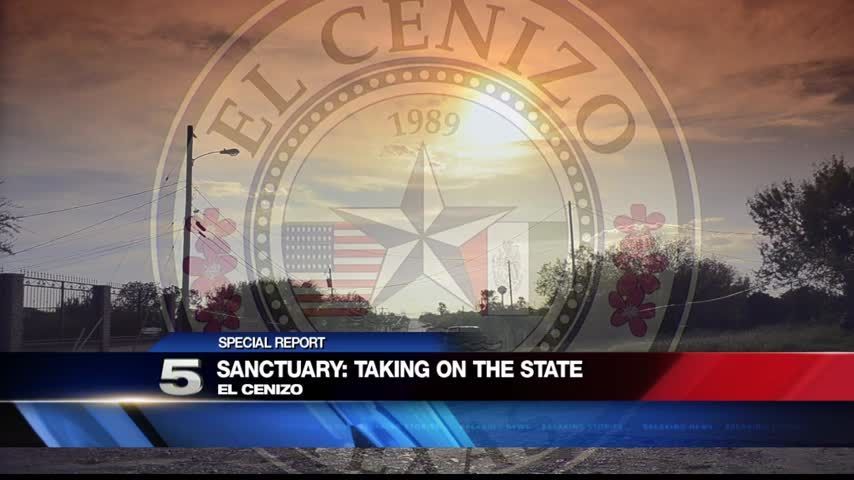Special Report: Sanctuary - Taking on the State
EL CENIZO – Texas Attorney General Ken Paxton is appealing federal Judge Orlando Garcia’s ruling to temporarily block Senate Bill 4 from going into effect Friday.
The judge said the law is unconstitutional. It was designed to make sanctuary cities illegal, and punish local government officials who limit federal immigration laws.
El Cenizo, a small Texas border town, led the charge against SB-4. El Cenizo Mayor Raul Reyes filed a lawsuit against the State of Texas just 22 hours after SB-4 was signing into law in May.
About 45 percent of the people in El Cenizo speak Spanish as their first language. Many of the people who live there crossed the border illegally.
El Cenizo’s “safe haven” ordinance prevents city officials, including law enforcement, from questioning a resident’s immigration status. This put the city at odds with the State.
Nnahum Gallegos crossed the border into the United States illegally in 1995. He felt a growing sense of anxiety in the days leading up to Garcia’s decision.
"Sanctuary,” said Nnahum Gallegos. “Yes, I think so. I think right now. I don't know later."
Gallegos felt SB-4 would increase the likelihood he’ll be deported, and his family separated.
"Yes it does worry me because here we have six children and we don't want them to stay here."
Alfonso Ayala is an American citizen living in El Cenizo. Like Gallegos, he speaks Spanish as his first language. He had a front row to El Ceizo’s transformation from the vantage point of his porch. El Cenizo became a city in 1989. It was considered a colonia in the years prior.
"When we moved here, there weren't many homes,” said Ayala. “There was one house here another one over there”
Ayala tells CHANNEL 5 NEWS people living in the El Cenizo illegally are making wills to leave behind with their loved ones as a result of SB-4.
"If they have families that have documentation, they're signing papers for them saying, if they catch me, you are the owner of this house,” said Ayala, “as if they were the owners. So you can sell it or whatever whenever I'm caught. Just send me the money or something. Many are doing that for their children. Just in case they get caught"
Mayor Reyes is the reason El Cenizo is at the forefront a statewide debate. He feels compelled to represent men like Ayala and Gallegos, alike.
"There are millions of U.S. citizens that live across the state of Texas, across our country that don't speak English,” said Reyes.
Reyes wasn’t always a passionate El Cenizo citizen. His family moved there over two decades ago to be near his ailing great grandmother.
"I told my Mom I didn't like it here,” said Reyes. “And I told her, I asked her. What are we doing here?"
He didn’t plan on becoming Mayor. He first wanted to be a teacher, then an international superstar.
"Over the course of months, years, I realized my singing abilities, weren't the best,” said Reyes.
Reyes went to school in nearby Laredo, Texas. He said El Cenizo’s roads were unpaved when he first arrived over 20 years ago.
As a result, he would carry mud and dirt into school on the bottoms of his shoes. Reyes said the people he went to school with would call he and other El Cenizo children “mojado” or “wetback.”
"I dare say it was not wanting my brothers to experience that or any other person to experience that was the main motivator for me to run for office at the age of 19," said Reyes.
Reyes won his first election as mayor at 21. He said he uses these moments as memories to fuel his fight against the state.
"For those out there that say these are undocumented illegal immigrants,” said Reyes. “Yes they are! But they look no different than myself, or than my family, or than my friends, or than my neighbors."
While Reyes wages his battle with the State, another man reaches a crossroads. El Cenizo police chief Edgar Garcia felt unsure when he heard SB-4 was signed into law.
"I was just extremely worried,” said Garcia. “I'd go home, and I'm like, what should I do? You know? Should I give up my position here as the chief of police?"
Garcia could still have to decide whether to uphold the city’s ordinance or comply with the senate bill if it eventually goes into effect as law.
"We can be penalized financially, or even face time in jail,” said Garcia. “Well honestly that's what I don't want. I really don't want that.”
The chief of police is considered a city official. El Cenizo bans city officials from asking residents about their immigration status.
“I'm trying to do a good thing here, and for me to get in trouble for that,” said Garcia. “I don't think that's right."
Garcia said he will make a decision the day SB-4 goes into effect as law, with no date of the kind in sight.
"That's when I'm going to figure out, what am I going to," said Garcia.
Texas Attorney General Paxton is filing the appeal in the Fifth Circuit Court appellate court in Louisiana.





